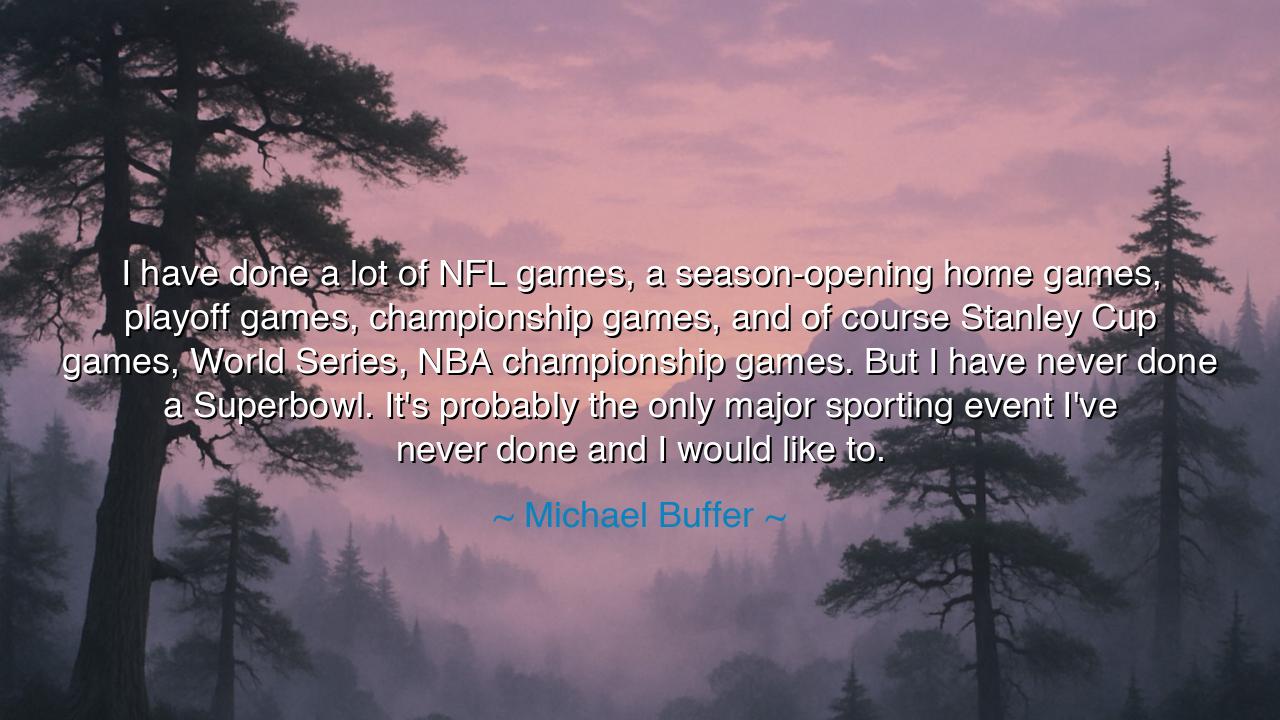
I have done a lot of NFL games, a season-opening home games
I have done a lot of NFL games, a season-opening home games, playoff games, championship games, and of course Stanley Cup games, World Series, NBA championship games. But I have never done a Superbowl. It's probably the only major sporting event I've never done and I would like to.






In the measured yearning of Michael Buffer—“I have done a lot of NFL games, season-opening home games, playoff games, championship games, and of course Stanley Cup games, World Series, NBA championship games. But I have never done a Super Bowl. It’s probably the only major sporting event I’ve never done and I would like to.”—we hear the stout heartbeat of unfinished destiny. The sentence is a ledger of triumphs followed by one deliberate blank line. Even after a lifetime beneath domes of thunder and lights like minted stars, the soul keeps a final summit in reserve. Glory is not gluttony; it is pilgrimage. The road bows to none but the traveler who still hungers to walk.
He speaks as masters of old once spoke, counting victories not to boast but to locate the one door still closed. The roll call—NFL, playoffs, championships, Stanley Cup, World Series, NBA—is the braiding of many laurels into a single wreath, and then the honest confession: the Super Bowl remains across the river. This is not complaint; it is compass. It tells us that excellence is a living thing, always pointing toward a horizon just beyond the most gilded milepost.
The origin of such longing is the craftsman’s vow. A voice like Buffer’s—tempered by countless arenas—knows that ceremonies make memory, and that each cathedral of sport has its own liturgy. To stand at midfield on that night when a nation holds its breath is not merely to add a line to a résumé; it is to complete an alphabet one has spent decades learning to pronounce. The desire is not for more noise, but for the fitting close of a well-loved story.
Consider a scene from older pages. When Alexander reached the edge of his maps, legend says he wept for want of worlds to conquer. But the wiser reading is this: he grieved the loss of a worthy horizon. Human greatness needs a task large enough to keep its humility awake. Buffer’s confession, far gentler, carries the same anatomy: the great work is not finished while one worthy altar stands unserved. To name that altar—Super Bowl—is to keep the heart young and the craft in motion.
Or think of Michelangelo, who, though he had frescoed vaults and carved giants from sleeping stone, longed still for the labor of the dome—to solve weight with grace and lift a city’s gaze. He did not chase novelty; he sought completion. So here: after season-openers and playoffs, after trophies paraded and banners raised, a single ceremony remains that would make the circle round. The desire is not vanity; it is the artisan’s instinct for wholeness.
What, then, shall we learn? First, count your milestones without mistaking them for the horizon. Let your catalog of victories become a map, not a museum. Second, name your unclaimed summit aloud—the one major calling you would like to fulfill—and let that naming summon allies and sharpen preparation. Third, hold ambition and gratitude in the same hand: grateful for the road already walked, ambitious for the footbridge still to build. This is the posture that keeps greatness from souring into entitlement.
Practice, too, a craft of pursuit. (1) Clarify the rite you seek—what skill, what presence, what preparation would make you unmistakably ready when the gate opens? (2) Serve the stages you already have as if they were the Super Bowl—because the messenger is proven on the lesser errands. (3) Cultivate patient visibility: relationships tended over years, not days; excellence so consistent that opportunity feels inevitable when it arrives. (4) When doors delay, deepen your art—study voices, study crowds, study silence—so that waiting itself becomes apprenticeship.
At last, keep this elder’s wisdom close: a life with one good longing left is a life still lit from within. The unfinished note does not spoil the song; it gives the melody somewhere noble to go. May we, like Michael Buffer, honor the arenas we have already filled, yet stand ready, voice bright and spirit steady, for that one remaining night when our calling and our preparation finally meet at the fifty-yard line—and the circle closes with joy.






AAdministratorAdministrator
Welcome, honored guests. Please leave a comment, we will respond soon